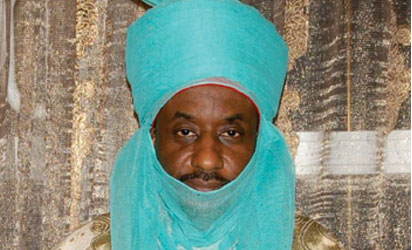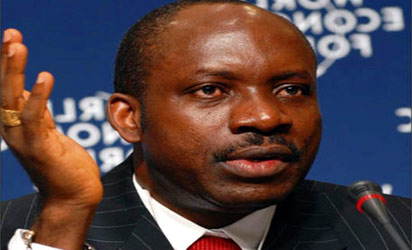When in late 2013, Lamido Sanusi, then Central Bank governor wrote to President Goodluck Jonathan asserting that about $20 billion was not accounted for by NNPC, many Nigerians dismissed the claim with a wave of the hand. The Federal Government, incensed by the claim, appointed an audit firm to carry out a forensic audit of NNPC account.
The report has passed a verdict that no money was actually missing. In fact, an audit report will always come out with the fact that no money is missing. Many still do not understand the basis on which Sanusi and in more recent time, Professor Chukwuma Soludo, Sanusi’s predecessor, accused the NNPC of billions of dollars leakage from the federation account.
In real terms, these figures are not found in any books nor can they be found lodged in any account. They are equally not imaginary figures. They are broad estimates of what the nation has lost as a result of the use of discretionary powers by the powers that have held the nation hostage for years.
For years now, stealing of oil from pipelines has been rampant and quantifying the amount surely is in the region of billions of dollars. But each time, the government pleads helplessness. How can a nation’s major source of revenue be allowed to be under the control of known thieves? Yet, a country that has a viable navy came out to tell the world that rogues are stealing oil. Are these thieves ghosts, and the vessels they use both invisible and invincible?
A look at the revenue profile of Nigeria reveals mounting waste, mismanagement and cash ‘leakages’ in Nigeria’s oil industry. Those who are conversant with developments in the Nigerian oil and gas industry will agree that there exists billions of proceeds of unaccounted for oil contracts, confidential government letters, top private government correspondence and legal opinions.
Nigeria has been suffering from financial hemorrhage and the high rate of cash leakage has resulted in the dire straits the economy has found itself today. There are three key observable mechanisms in Nigeria through which some privileged few allow middlemen to channel oil funds away from the country. Among those involved in this act are government officials and high-flying society figures. The three mechanisms are contracts awarded non-competitively to companies that did not supply services but sub-contracted the work; a kerosene subsidy that doesn’t help the people it is meant to help; and a series of complex, unclear ‘swap deals’ that has short-changed Nigerians.
It is common knowledge in the industry that the 2011 sale by Royal Dutch Shell of its interests in five oil fields were fraught with under-the- table deals. The blocks were majority-owned by NNPC.
According to Reuters reports, Shell sold its interests in the fields to companies in Poland and Britain. But the new owners did not get the same rights Shell had. To promote local control, the NNPC gave the rights to operate the fields to its own subsidiary, the Nigerian Petroleum Development Company (NPDC). Without soliciting bids, the NPDC signed “strategic partnership agreements” worth around $6.6 billion with two other local firms to manage them. In this deal, Seven Energy signed for three fields; and Atlantic Energy, for two.
Seven Energy was co-founded in 2004 by Kola Aluko, an oil trader. Aluko also co-owned Atlantic with Jide Omokore. Atlantic was incorporated the day before it signed the deals. Geneva-based Aluko is a high-profile member of Nigeria’s elite.
Omokore has also become rich from oil and gas. Forbes has estimated annual revenue at another of his companies, Energy Resources Group, at $400 million.
A review of the contracts the firms signed with NPDC showed that NNPC gave Seven Energy 10 per cent of profits in the three oil blocks it operates, while Atlantic gets 30 per cent of profits in its two blocks. The contracts also show that unlike Shell, neither firm pays royalties, profit tax or duties to the Federatio Account. Here is another of the leakages.
The third cash leakage is a decades-old subsidy regime provided to retailers of kerosene. Nigeria lacks the refining capacity to make kerosene, so it imports instead. The government then sells the kerosene to retailers at a cheaper price than the import price. This subsidy is meant to make kerosene affordable to the poor. In June 2009, late President Umaru Musa Yar’Adua ordered a halt to the scheme on the grounds that it was not working. But the subsidies continued regardless. The kerosene subsidy is a “racket” that lines the pockets of private kerosene retailers and NNPC staff. The cost of the subsidy is estimated at $100 million a month.
The fourth leakage involves other types of refined petroleum products such as gasoline. Like kerosene, this is also imported. To pay for the imported products, Nigeria barters its crude oil. These barter exchanges are known as ‘swap deals.’ The idea is that importers who bring in refined fuel worth a given amount, receive an “equivalent value” in crude oil. How that equivalent value is determined is unclear. It is estimated that between 2010 and 2011, traders involved in swap deals effectively bartered 200,000 barrels of crude a day — worth nearly $20 million at average crude prices over the period — for a loosely determined equivalent value in refined products.
These traders only account for petrol. The others such as diesel and kerosene are not accounted for, but subsidy is paid. It is the aggregation of these leakages that in the mind of an economist, amounted to the estimated billions of dollars that are not accounted for.
Nigeria is a farm for the privileged few; ask me again if any money is unaccounted for.
VANGUARD
END



That the forensic report of the engaged audit firm indicted the Petroleum Corporation (NNPC)is in itself damning and discrediting altogether. Even the unschooled in macro economics understands that there are manipulations and discrepancies in the way the managers of our collective resources and commonwealth of this nation. Soludo and Sanusi are just being forthright in what and all they evinced about the state of mismanagement of the revenue accruing to the government. But like the Oduhagate scandal, this will also goes under the carpet because the one that is expected to take the bull by the horn and frontally address the rot see such as mere stealing and not corruption.